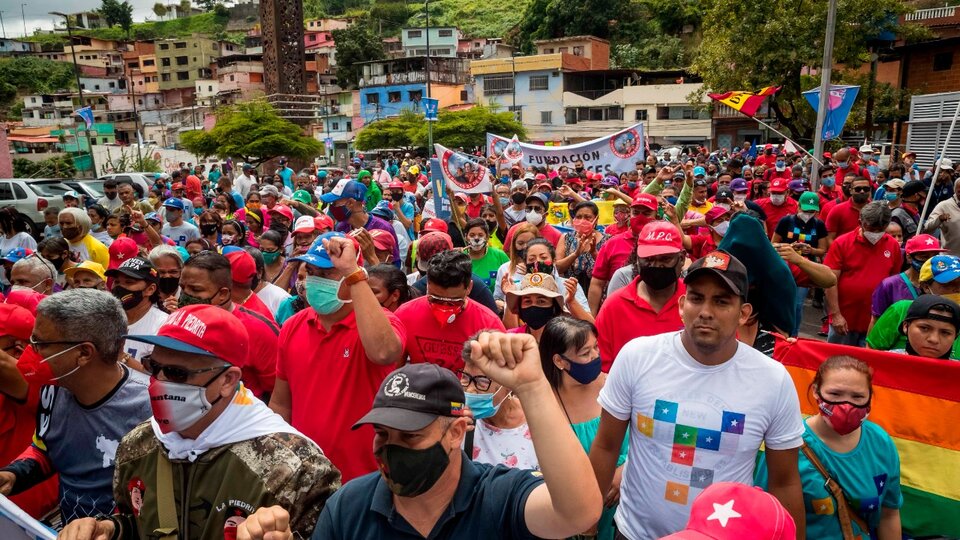
[ad_1]
From Caracas
Next Sunday, December 6, legislative elections will take place in Venezuela, one of the most important in the country in the current political conflict. On that day, more than 30,000 voting tables will be installed in more than 14,200 polling stations, as the National Electoral Council announced on Sunday during a new audit day of voting machines.
The implications of the results will be diverse. A new majority will be at stake in the National Assembly disputed between Chavism, through the United Socialist Party of Venezuela, and the alliance of the Great Patriotic Pole, the so-called Popular Revolutionary Alliance, and a heterogeneous opposition made up of different forces, such as Avanza Progressive, Solutions for Venezuela, El Cambio, Primero Venezuela, Movimiento al Socialismo and part of Acción Democrática.
On the other hand, it will be about the renewal of one of the powers which was at the center of the conflict and of political destabilization. It was from the Assembly that the opposition tried to declare the “abandonment of his functions” of Nicolás Maduro in 2016, which opened the doors to the escalation that followed in 2017. It is also to from there that the “interim presidency” of Juan Guaidó was built in January of 2019.
Unlike 2016, 2017 and 2019, where there was a unified space for the opposition majority, the current legislative elections show a photo of an opposition split between those who will participate on December 6 and those who will not. not, subdivided in turn among those who they rally around the figure of Guaidó, parties and leaders who have distanced themselves critically.
The sector led by Guaidó is campaigning to carry out what it called a “popular consultation”, announced for December 12. The consultation will have three questions: are you calling for an end to the usurpation of the presidency by Nicolás Maduro and are you calling for free, fair and verifiable presidential and parliamentary elections? Are you rejecting the event of December 6 and asking the international community to ignore it? Are you ordering the necessary steps before the international community to activate the cooperation, support and assistance that allow us to save our democracy?
Each block will have a lot at stake with the results. Guaidó must demonstrate that he still maintains social support after nearly two years of a marked process of loss of strength. The success or failure of the consultation will be at the heart of what will follow in 2021, in particular because since his “interim presidency” is no longer in the Assembly, he will not have the support on which his fiction has. been made.
The opposition sector which has chosen to participate must for its part show that it is indeed an actor with political capital and supported in voice, in order to thus occupy the space of the new Venezuelan opposition after the course of those who remain with Guaidó and the coup strategy.
As for the Chavismo, its goal will not only be to achieve legislative majority and endorse its social support, but also for there to be strong participation to give greater legitimacy to the competition both internally and to the international, where it will have the recognition of several governments, such as those of Mexico, Bolivia, Argentina, Russia and China, but it will not have that of others, such as the United States ( USA) – who sought to prevent the challenge – the European Union and several right-wing governments in Latin America.
December will leave a photograph of the correlations of political forces, including the abstention variable, from which each actor will be able to stand, with more or less capacities, facing 2021 which will surely have changes in some keys to the conflict. One of these changes will be given by the new US administration, chaired by Joe Biden, who will take office in January.
It is still early to know what policies will be taken by the new government that will have Antony Blinken, who was part of foreign policy under Barack Obama, head of the State Department. However, it seems likely that there will be changes, given, for example, various analyzes published in the media and Democratic think tanks, which argue that the strategy – or lack thereof – deployed by Donald Trump to topple Maduro will not he achieved his goal.
Although recognition of Guaidó has been bipartisan in the United States from the start, it is likely that the situation will change and, in this context, a poor performance in the framework of the “popular consultation” would further distance Guaidó from a centrality. in the next architecture built from Washington.
A main point of the debate on possible changes will center on the economic blockade, criticized in Venezuela by political, economic and social actors, and questioned by the United States for its lack of effectiveness. Could the Biden administration make the negotiation of intermediate points other than Maduro’s immediate departure from political power more flexible? There is a question before that: what priority will Venezuela have in post-Trump US foreign policy?
The legislative elections carry the possibility of being a turning point in a conflict which sometimes seems to be repeated on the surface, but which has profound modifications outside camera, in a country threatened by the economic situation which has again been hit by a rise in the economy. dollar which It went from around 700 thousand bolivars to 1.2 million in a few days, approaching the figures of 2018, when the sign of the currency was reconverted.
.
[ad_2]
Source link
 Naaju Breaking News, Live Updates, Latest Headlines, Viral News, Top Stories, Trending Topics, Videos
Naaju Breaking News, Live Updates, Latest Headlines, Viral News, Top Stories, Trending Topics, Videos